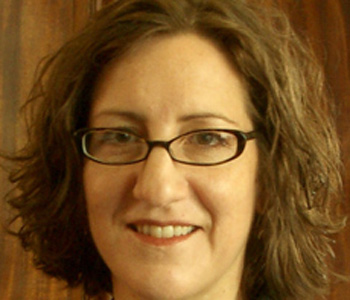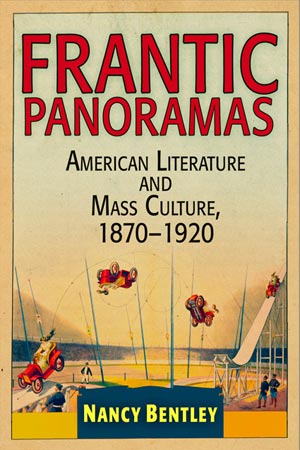
My book looks at what happened to American literary culture when a new world of mass culture—tabloid newspapers, amusement parks, early cinema, Wild West shows—began to dominate public life. Most writers and intellectuals reacted with alarm. Mass culture seemed to offer only novelty and sensation rather than reflection. It valued profit over refinement or learning. And the American population was far more interested in these new kinds of mass entertainment than in serious literature. In the 1890s, for instance, showmen began staging live train wrecks that sometimes drew upwards of 150,000 people.
But I discovered there was more to the story than just writers’ phobic reaction. Even though literary writers criticized things like racy dime novels and staged train wrecks, they also borrowed some of the same energies of shock, speed, and danger for their own literary works. I realized that the polished novels of Edith Wharton, for instance, return again and again to the image of a car crash or a train wreck—right at the time that film studios were churning out movies featuring high-speed smash-ups. And some of the most cerebral works by authors like Henry James, Henry Adams, and W.E.B. Du Bois share a surprising resemblance to the “aesthetics of astonishment” that characterized vaudeville and early cinema.
Why did writers partly imitate what they decried? I’m convinced it’s because they recognized that mass culture was tapping into new kinds of human experience that literary culture had previously ignored or dismissed as meaningless.
Early cinema, for instance, captured a wish for mobility and a hunger for sensory pleasures that were especially strong among groups like immigrants and women. Spectacular events like large-scale accidents or disasters (whether staged or real) turned out to create unexpected solidarities among strangers.
Even though mass culture was attuned to sensation, then, it was still responsive to deep human concerns and interests. And these were interests that literary culture, with outdated definitions of public opinion and the common good, had no way to address or understand. So when writers began to combine cerebral styles with literary versions of shock and sensation, they were trying to uncover the possible meaning behind the strange new landscape of mass culture.
“Some of the most cerebral works by authors like Henry James, Henry Adams, and W.E.B. Du Bois share a surprising resemblance to the ‘aesthetics of astonishment’ that characterized vaudeville and early cinema.”
My book joins an ongoing debate about how we should think about reason.
In recent decades, literary scholars have been somewhat skeptical about the high value nineteenth-century intellectuals placed on different kinds of rationality–scientific objectivity, political disinterestedness, and cosmopolitanism, among others. Most people recognize these are important ideals and powerful mental tools. But certain schools of critical history (influenced by thinkers like Michel Foucault, for instance) have raised red flags. The prestige that Western societies have accorded reason, they argue, can’t really be disentangled from some of the more pernicious aspects of our history, such as imperialism and racism.
I test these questions about reason by examining four different literary projects from this period: literary realism, African American letters, Native American scholarly writing, and the philosophical movement of American pragmatism. By looking at the different ways that writers tried to harness rational reflection and artistic insight, we can see that literary culture had an uneven connection to the ideal of reason.
When literary writers confronted mass culture as a serious rival, their first reaction was to assume this was going to be a contest of reason against unreason. There was a good deal of truth to that view. Beginning in the eighteenth century, literature and cultural criticism had helped to carve out a space for debate and reflection (what we now call the public sphere) that allowed people to reason together about politics and social change. Writers saw literary culture as a site of reason. Commercial culture, they believed, was just a site for profit, mindless entertainment, and unenlightened appetites and prejudice. (Think of blackface minstrelsy, for instance).
But when you look more closely at the way literary culture was actually organized in this period, things get more complicated. For instance, African American intellectuals had to organize their own literary society, the American Negro Academy, to cultivate “the highest arts.” They were as committed as anyone to the idea that high art and critical thought were a crucial use of human reason. But they also knew that the white “cultured classes” rejected them. Black people were banned from most museums and concert halls. Even educated black people were largely excluded from white-run universities and literary journals. So even in pursuing the same ideals of cosmopolitan thought and public reason, African American intellectuals still found themselves outside the public sphere.
This doesn’t mean that the ideals of reason and reflective art are nothing more than a front for the interests of those in power. But we also can’t assume that those ideals by themselves create open communication or foster cosmopolitanism.
As I show in another chapter of Frantic Panoramas, Native American intellectuals also tried to join literary culture in this period. They founded a scholarly institution, the Society for the American Indian, and began publishing fiction and criticism in highbrow journals. But ironically, it was actually by participating in mass culture—Wild West shows, celebrity appearances by figures like Geronimo and Sitting Bull—that Native Americans found a way to address the larger public.
The larger story of my book tells about how the most far-sighted writers began to recognize that literary culture had certain blind spots. What’s more, they discovered that mass culture might actually offer clues and insights about modern society that literary culture had not yet detected. But they didn’t just stumble across these insights. Literary writers in all corners of American culture–from Lakota reservations to New York salons–discovered these truths by extending literary reflection into new mass culture spaces. Reason by itself is not enlightened. But it does have the ability to reflect on itself and to open itself up to what it has previously written off as unreason.
One area of literary culture from this period presented a striking puzzle. Whereas most serious writers looked at mass culture with disdain and alarm, there were important exceptions. I came to ask myself why the most accomplished African American writers had tried their hand at both high literary writing and “low” mass culture. James Weldon Johnson, for instance, left behind a stellar career as a black educator to try to break into the world of commercial theater in New York, before eventually turning to serious literature. The poet Paul Laurence Dunbar also wrote black musicals that became wildly popular, even though the narrator of his novel The Sport of the Gods condemns such productions as tawdry. Even W. E. B. DuBois tried his hand at creating a popular pageant. But virtually no white writer from this period participated in both high literary culture and mass culture (although Mark Twain came close).
And there is another factor in this puzzle. African American writers and intellectuals—far more than white writers—faced a tangible threat from mass culture. Commercial culture flooded homes and public spaces with defamatory images of black people. Before the Civil War, minstrelsy was largely confined to small theaters and carnivals; now racist depictions appeared on trading cards, clocks, dolls, advertisements, cartoons, and early cinema. This period also saw an epidemic of lynching, of course, and those violent events were often turned into a grotesque form of entertainment.
Why, then, would black artists be drawn to commercial culture? One reason, of course, was necessity. High culture institutions were largely closed to black artists. And many lacked the education necessary to qualify for highbrow culture—though even highly educated black artists were largely shut out, too. But racial exclusion is not the whole story. Despite the insidious racism in so much of mass culture, African Americans still found ways to invent new kinds of creativity in areas like popular theater, mass-market music, and dance.
One of my chapters focuses on the part of mid-town Manhattan dubbed “Black Bohemia” in this period. Several decades before Harlem became a center for higher artistic achievement, in this part of New York black performers established a thriving area of clubs and theaters where commercial culture was the cutting edge. And while literary intellectuals like Dunbar, Johnson, and DuBois recognized the strains of racist ridicule in so much of popular culture, they also realized that commercial productions were often less rigid than either science or high culture when it came to recognizing black creativity.
“Reason by itself is not enlightened. But it does have the ability to reflect on itself and to open itself up to what it has previously written off as unreason.”
Frantic Panoramas tries to offer a kind of prehistory of our own media-saturated culture. A hundred years ago, the advent of mass culture created a kind of crisis among intellectuals and the educated classes, a crisis not unlike our current uncertainty about digital culture.
During the period I examine, literary culture was clearly losing its central role in defining reason and public opinion. Instead, consumer-driven media and writing “untouched by criticism,” as Henry James put it, were pushing literary authorities to the margins. This was a crisis for literature, but it was also an opportunity: losing their public influence, I argue, eventually prompted writers to create new kinds of critical thought. The challenge forced literary culture to renew itself and acquire new ways to understand modern society.
Today our digital culture seems to be pushing print culture itself to the margins. The history I examine suggests this could be an opportunity for literature: digital literacy still relies on language and reading practices, so it might well generate new kinds of reading habits and literary forms. And the new literature might circulate widely.
But will these new reading practices still be critical? That is a lot harder to predict, because our whole idea of what “critical” thinking is has been developed in and through a world created by print.


Nancy Bentley is a Professor of English at the University of Pennsylvania. She has also published a book with Cambridge University Press, The Ethnography of Manners: Hawthorne, James, Wharton, and has edited (with Sandra Gunning) a novel by Charles Chesnutt, The Marrow of Tradition, that appeared with Bedford Books. She has published essays on topics such as law and literature, African American fiction, and theories of the novel as a genre.